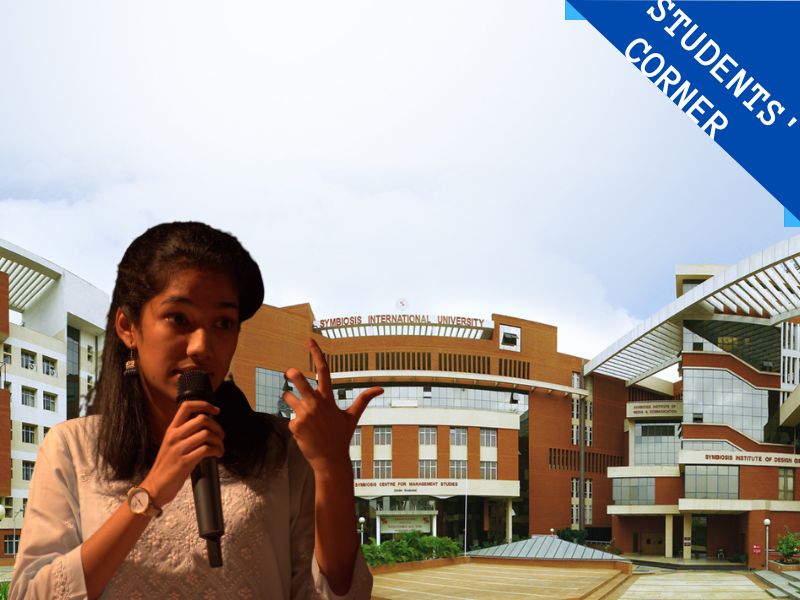Trisha Welde, a third-year student at the Symbiosis Centre for Media and Communication (SCMC) is pursuing her Bachelor of Mass Communication degree with a specialisation in advertising. Sociable and friendly, Welde’s love for public speaking and organising events fits perfectly with her role as the deputy student council head at SCMC, Pune. She is also the cultural coordinator for the batch.
Her avid interest in branding sees her discussing brands and advertising strategies with like-minded people, sharing thoughts and ideas, and bringing those ideas to life. She wishes to pursue her Master’s in Business Administration from one of the top business schools in the country before joining the corporate world as a marketing professional.
EducationWorld talks to Trisha Welde in its next story of the Students’ Corner series which puts special emphasis on students and their views.
What kind of classes are being conducted in your educational institution currently?
At SCMC, we have adopted a hybrid mode of education, with a combination of online and offline classes. In our offline classes, we have classroom lectures along with practical sessions in our labs, audio rooms, and shooting floors.
What has been the general mood amongst students regarding attending offline classes and possible closures amidst the rise in COVID cases in the state?
The surge in cases and the possibility of the institution shutting has made students more responsible while following COVID protocols. Some students continue to spend as little time as possible in public. Students are experiencing offline college after a year and a half so they certainly don’t want to let go of the privilege.
How challenging was it to carry out your responsibilities as a students’ council representative in a virtual setup?
It was very challenging since the responsibilities in a virtual setup are far more complicated compared to an offline setup and the scope of work is restricted particularly with reference to the pace of work. However, by maintaining constant communication with the faculty, and admin, I was able to do my best.
It was difficult to coordinate and shuffle between time zones and schedules while communicating with students. However, my team and I were able to host multiple extra-curricular activities including cultural fests and ensured that students were constantly engaged. So we got a feel of college life, even in the online scenario.
How according to you could your institution bridge the learning gap caused by the closures?
I don’t see much of a learning gap at our institution. Since we are a media college, our faculty ensured we were equipped with the appropriate knowledge and tools for experiential learning by either revising concepts, holding extra practical sessions, or inviting guest experts.
When we shifted to the online mode, we missed out on some classes. Our institution re-scheduled those previous classes in the new semester to cover up the loss. We also had regular revision classes scheduled for every course at our institution. We are having online exams currently since the institution follows a hybrid mode of teaching.
How did you manage your study schedule during the pandemic?
Initially, it was difficult to adjust and just exhausting to be studying at home, in one room, with only the laptop as a constant. However with time we adapted, and managed to create a schedule for our day, ensuring a balance of academics, work, personal projects and other extra-curricular activities. To keep our motivation intact, we often had group study sessions over video call, or would finish our assignments together.
How were your practical classes (lab sessions) managed during the pandemic?
All the practical classes were given the required support during the pandemic through individual attention given by the professors. The institution also arranged practical sessions once college reopened and 90 percent of our classes were practical sessions. The theoretical portions had already been covered during the pandemic.
Do you think in the absence of in-person interaction with your teachers, you missed out on knowing about career and higher education prospects available to you?
No, because our faculty would often discuss these aspects with us post classes or as part of the class discussions. We also had many online guest sessions during the pandemic wherein students and industry experts would share their experiences providing exposure with respect to future options.
Have you understood the National Education Policy 2020?
I think the National Education Policy 2020 is primarily a more inclusive policy. All the initiatives of the policy and the changes have been proposed keeping in mind the challenges and skills of the new generation and the needs of the industry. Having multiple exit points, a credit bank system are exceptional ideas and will definitely transform the Indian education system, placing it at the same level as western education. However, we must wait for the final implementation and impact of this policy to analyse its true effect on students.
Also Read: Students’ Corner: Kriti Garg, SAI International School
